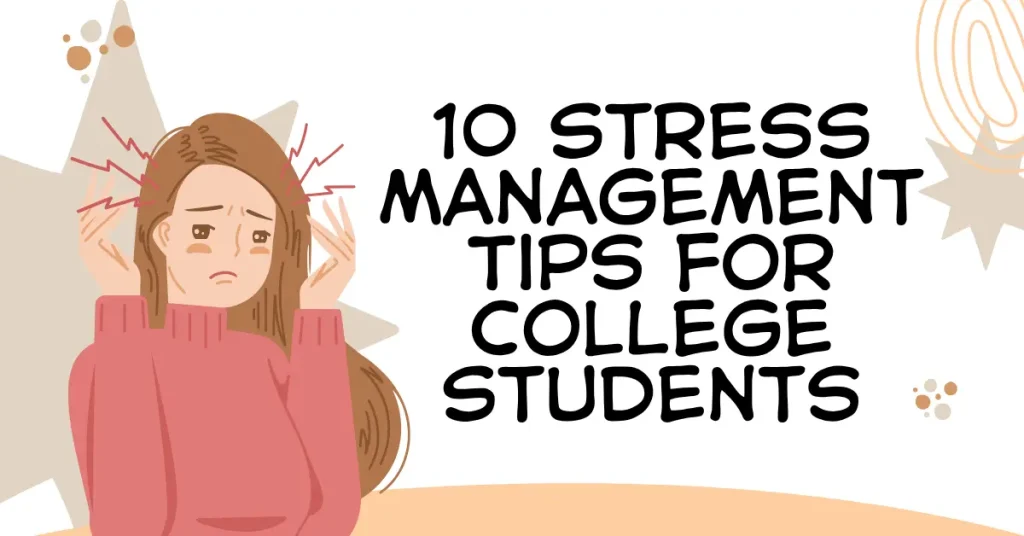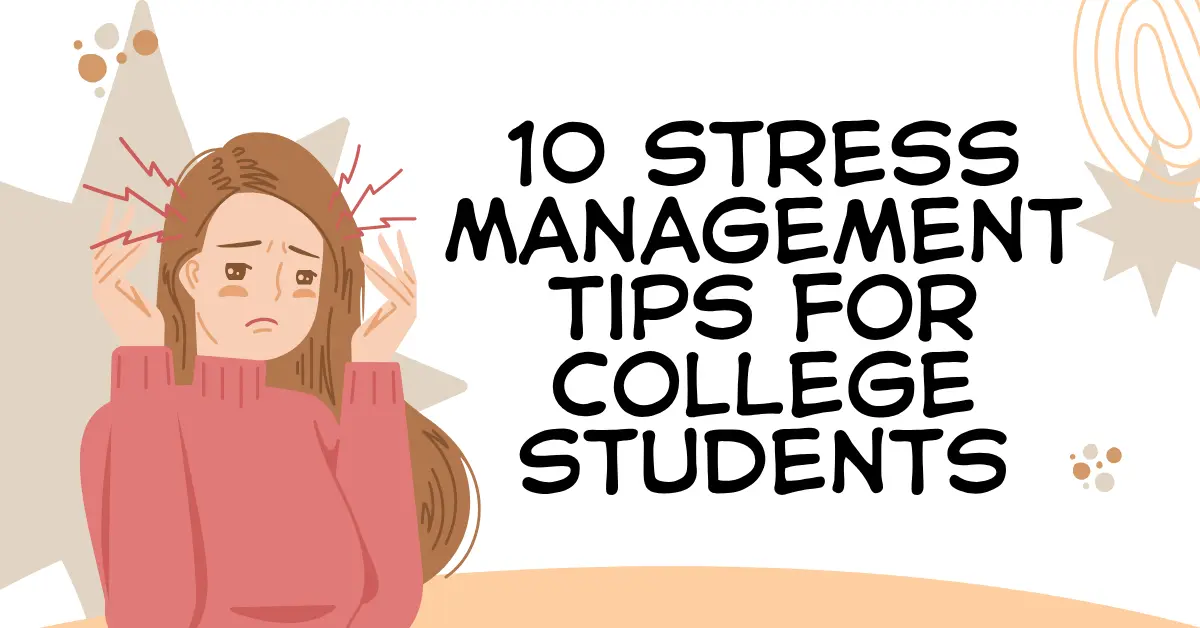You can study hard and still feel calm. I say that with care because I work with students every day at AllAssignmentHelp.org. I see bright minds face pressure, fast weeks, and late nights. You want marks you can trust, a schedule that works, and a plan you can follow. This guide shows you how. I keep the language simple. I keep the steps short. I focus on what helps right now. You will see 10 stress management tips for college students, plus a daily routine you can copy. I include student mental health tips, ways to reduce academic burnout, and university stress relief techniques that fit busy study weeks.
-
Why does stress rise in college?
- Tip 1: Plan a simple week to deal with academic pressure
- Tip 2: Study in focus sprints to save your brain
- Tip 3: Guard your sleep like a class you must pass
- Tip 4: Move your body every day
- Tip 5: Use mindfulness for students (yes, it can be quick)
- Tip 6: Talk early and share the load
- Tip 7: Eat simple food and drink enough water
- Tip 8: Managing exam anxiety with a steady ritual
- Tip 9: Build a self-care routine for university students
- Tip 10: Set healthy limits with tech and socials
- Final word: You can do this
- Frequently asked questions
Why does stress rise in college?
College asks a lot. You face new subjects, money worries, and time pressure. You may live away from home. You may work a job as well. These causes of student stress stack up fast.
Common triggers include:
- Big units and tight due dates
- Group work and unclear roles
- Labs, placements, and travel
- Sleep loss and skipped meals
- News, socials, and doom-scrolling
It helps to name the problem. Once you see it, you can fix it. The steps below give you student stress solutions you can use this week.
Tip 1: Plan a simple week to deal with academic pressure
You do not need a fancy app. A pen, a calendar, and 15 minutes will do.
- Write all due dates for the next four weeks.
- Block 60–90 minutes for each unit, three times a week.
- Add commute, meals, and breaks.
- Add fun time. Yes, you need it.
Plans cut noise. They help you cope with college stress because you stop guessing. You see the work. You make room for it. That is dealing with academic pressure the smart way.
Pro tip: Name each block by task. Say “ECON101 Week 4 quiz prep” instead of “study.” Clear labels lower stress and lift focus.
Tip 2: Study in focus sprints to save your brain
Long marathons drain you. Short, sharp sprints build wins. Try this simple flow:
- Set a 25-minute timer.
- Remove your phone from the desk.
- Work on one task. No tabs, no texts.
- Take a 5-minute break.
- Repeat four times, then take a longer break.
This builds stress-reducing habits. You feel small wins all day. You also build mental resilience because you train your focus like a muscle.
Try this: Use a cheap kitchen timer. Keep it away from your screen. The act of pressing start helps your brain switch on.
Tip 3: Guard your sleep like a class you must pass
Sleep resets your mood, memory, and focus. You learn faster after a good sleep. You also feel calmer.
- Aim for 7–9 hours.
- Keep the same sleep and wake time.
- Stop screens 60 minutes before bed.
- Keep the room dark, cool, and quiet.
Set a night alarm. When it rings, you start your wind-down. Read light pages. Stretch. Breathe. You will wake clear and ready to learn.
Tip 4: Move your body every day
You do not need a gym pass to gain calm. Ten to twenty minutes helps a lot.
- Walk briskly around the block.
- Do bodyweight sets: push-ups, squats, planks.
- Try a short bike ride or a swim.
- Put on a song and dance in your room.
Moving your body can quickly boost your mood. It’s a simple way to manage stress anytime, anywhere, great for students dealing with screen tiredness, sleep problems, and the pressure of management assignment help.
Tip 5: Use mindfulness for students (yes, it can be quick)
You can learn meditation for stress relief in minutes. Keep it simple and real.
One-minute calm breath
- Sit tall with feet on the floor.
- Breathe in through the nose for four.
- Hold for two.
- Breathe out through the mouth for six.
- Repeat five times.
This is mindfulness for students that you can do before class, before a quiz, or on the bus. You guide your breath. Your breath guides your mind. You build emotional balance on demand.
Tip: Pair your breath with a word. Inhale “here.” Exhale “now.” Your mind will stop chasing the next thing.

Tip 6: Talk early and share the load
Stress grows in silence. Share it. Talk with a friend, a classmate, or your tutor. Use campus support. Most Aussie unis offer free short-term counselling.
- Book one chat before week five.
- Use study groups for tough units.
- Ask your tutor one clear question per class.
- Tell your mates when you need quiet time.
You act with care when you ask for help. You set a model that your mates can copy. That builds strong teams and a college life balance.
Tip 7: Eat simple food and drink enough water
Food shapes mood. Your brain needs fuel that lasts.
- Aim for protein at each meal.
- Eat fruit and veg every day.
- Keep nuts or yoghurt for quick snacks.
- Sip water often.
- Pace coffee. Stop it six hours before sleep.
These are healthy ways to deal with stress. You feel steady, not wired. You think clear thoughts. Your body thanks you at exam time.
Tip 8: Managing exam anxiety with a steady ritual
Nerves show that you care. You can feel alert and still feel calm. Build a how-to relax during exams plan you can repeat.
Night before
- Pack your bag.
- Lay out your clothes.
- Skim key notes and stop.
- Set two alarms.
Hour before
- Eat a light snack.
- Drink water.
- Do one minute of calm breath.
- Repeat your top three facts for the unit.
At your desk
- Plant your feet.
- Slow your exhale.
- Read the whole paper.
- Mark easy wins first.
This steady exam anxiety ritual saves time and keeps your mind cool.
Tip 9: Build a self-care routine for university students
Self-care is not a spa day. It is a small daily act that fills your tank. Keep it short and real.
Pick one from each line:
- Morning: stretch, journal, or take the sun on your face.
- Midday: slow breath, quick walk, or stand to drink water.
- Night: read a light page, hot shower, or legs-up-the-wall pose.
This self-care routine for university students supports student wellness. It makes room for joy. It keeps your mood steady when weeks speed up.
Tip 10: Set healthy limits with tech and socials
Phones help, and phones distract. You can use them with care.
- Turn off non-urgent alerts.
- Move social apps off your home screen.
- Use screen time limits for peak study hours.
- Charge your phone outside the bedroom.
These small wellness strategies for students lower noise. Your focus grows. Your stress drops. Your free time feels like real time.
Read more: 10 Real Case Study Examples
Final word: You can do this
Stress feeds on chaos. Calm grows from small, repeatable steps. Pick two tips and start today. Add one new habit each week. Keep your plan kind and simple. If you need a hand with coursework or tight timelines, AllAssignmentHelp.org stands ready to help you stay on track and keep your head clear.
Frequently asked questions
What is the fastest way to calm down before an exam?
Use one minute of slow breath. In for four, hold for two, out for six. Plant your feet. Read the whole paper. Start with easy marks.
How can I manage time with work and study?
Plan fixed work blocks first. Then fit 60–90 minute study blocks on three days. Keep one full rest day. Tell your mates your quiet hours.
What if I lose focus every five minutes?
Make sprints shorter. Try 15 minutes on, 3 minutes off. Stand up for breaks. Place your phone in another room. Write one clear goal per sprint.
How do I ask for help without feeling weak?
Use a script. “I need help with Topic X. Here is what I tried. Can we plan the next step?” That shows effort and invites clear support.
Is caffeine good or bad for stress?
Caffeine can help focus in small amounts. Stop it six hours before bed. Drink water. Avoid extra shots on high-stress days.









